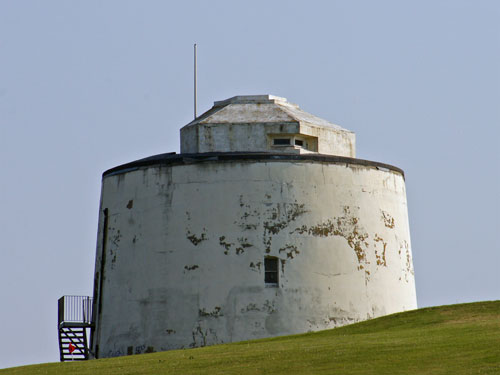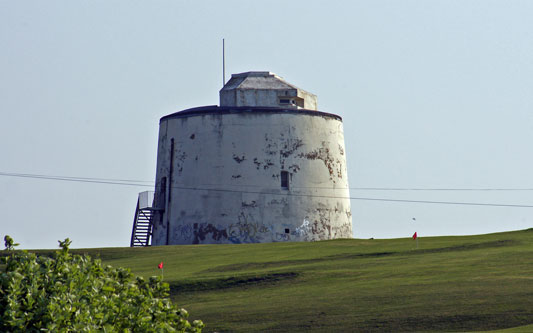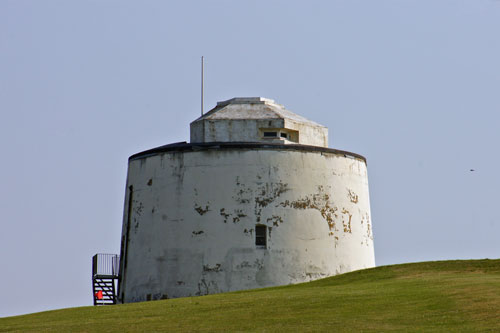|
|
|
| |
Pier - Cliff Lift - Port - Lighthouses - Railway
All images link to larger
copies which will open in a new window/tab
|
|
|
This page shows images of the pier, cliff lift, port and
lighthouses at Folkestone.
|
|
|
|
|
|
Piers - Cliff Lifts - Port - Lighthouses
All images link to larger
copies which will open in a new window/tab
Local estate agent G.B. Trent formed the
Folkestone Pier & Lift Co. in the early 1880s, originally proposing an
800 foot pier. The foundation stone was laid on 7th May 1887 and the
Victoria Pier (in honour of the 1887 Golden Jubilee), opened on 21st
July 1888 to the design of M.N. Ridley. The finished length was 683 feet
and included a 700-seat pavilion. The first floating landing stage was
added in 1890 but was rarely used.
The pier was popular but not profitable until
1898. In 1903, Keith Prowse & Co. Ltd. took over the lease on the
pavilion and introduced variety performers including Lily Langtry and
Dan Leno. In 1907, the lease on the pier transferred to local
businessmen Robert and Lloyd Forsyth who abandoned expensive
entertainers in favour of more profitable attractions such as wrestling,
a cinema, and beauty contests.
In 1910, the 'Olympia' roller-skating rink was
added on the shore to the west of the pier. The pier was sectioned in
1940 for defence purposes. A temporary bridge was installed in 1943, but
a fire on Whit Sunday wrecked the pavilion and badly damaged the seaward
end of the pier. The remains were demolished in 1954.
Ref:
www.piers.org.uk
Postcards of Folkestone Victoria Pier
All images link to larger copies
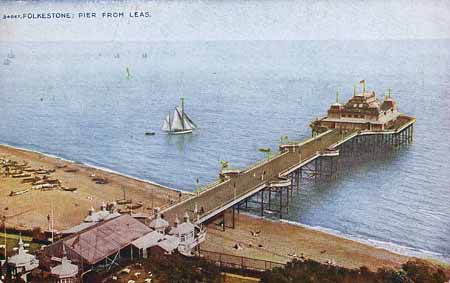
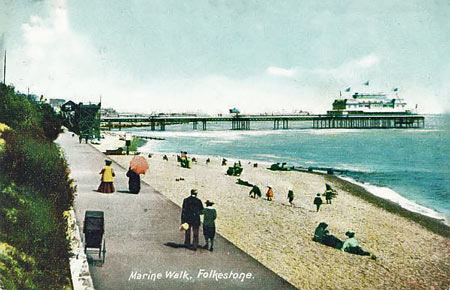
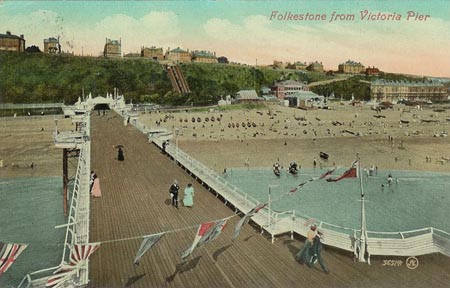
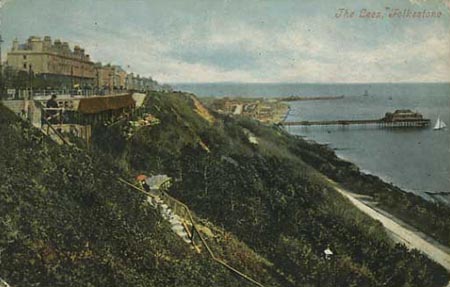
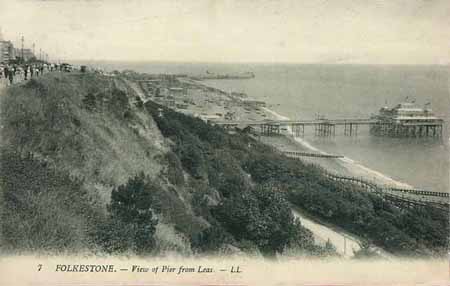
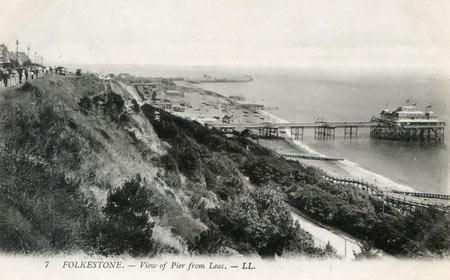
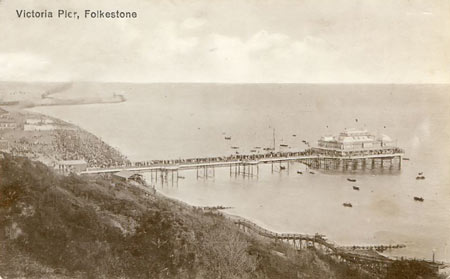
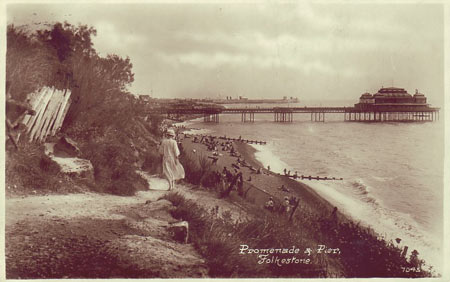
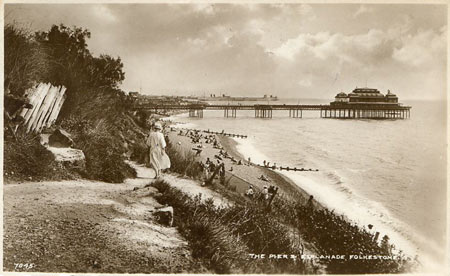
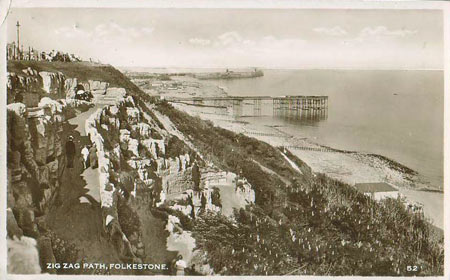
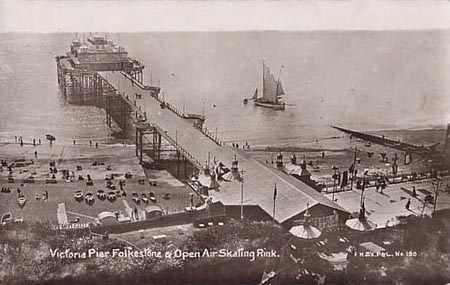

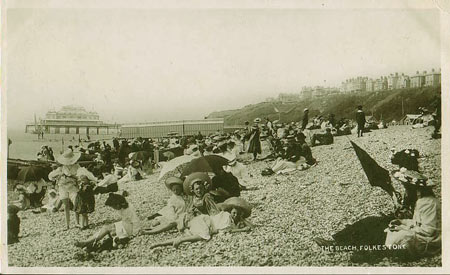
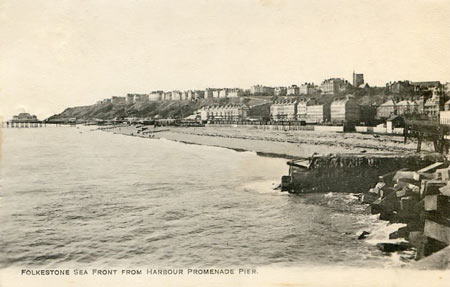
Postcards of Folkestone Railway Pier
The gantries with cranes extended beyond the outer pier wall.
The second card shows three turbines and a cargo vessel in port.
The third turbine is berthed on the outside of the pier under the
gantry, maybe loading coal away from the passenger areas?
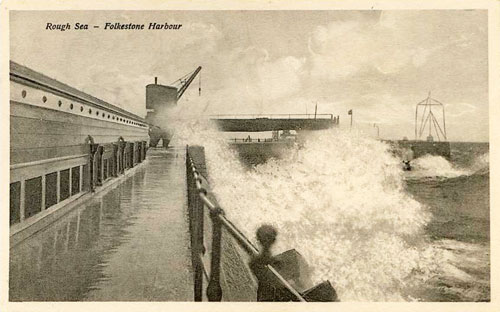
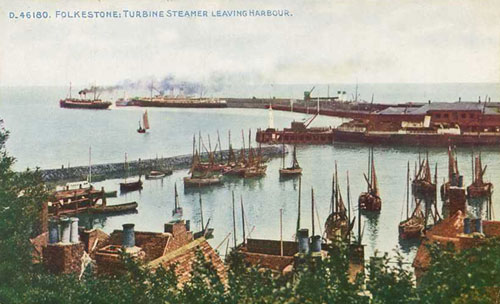
Postcards of South Eastern paddle steamers and Folkestone
Railway Pier
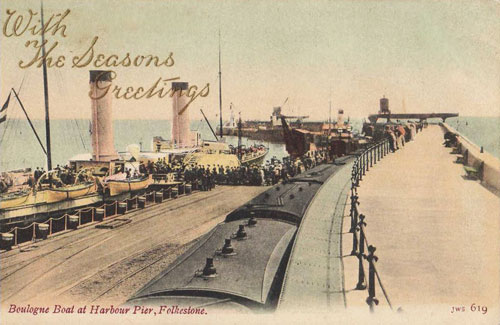
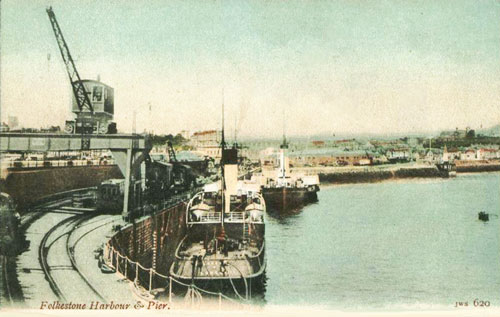
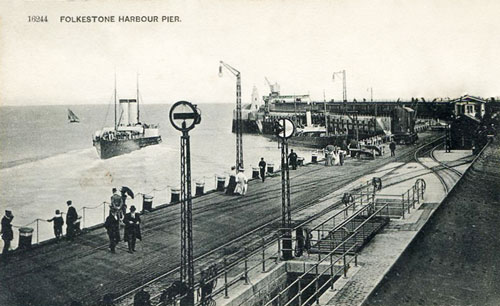
Postcards of South Eastern turbines and Folkestone
Railway Pier
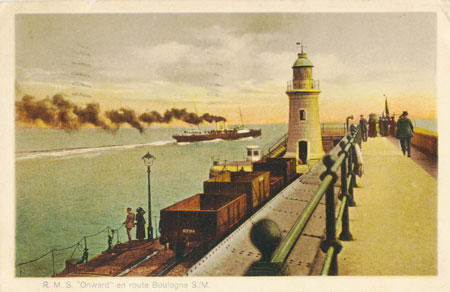
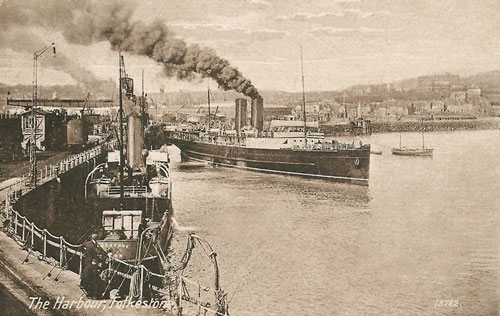
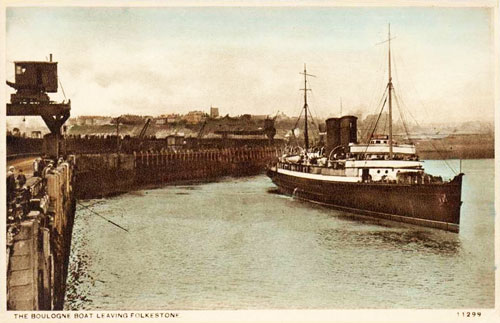
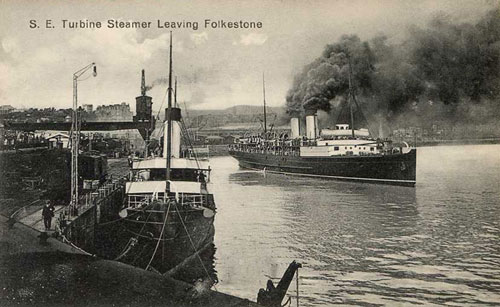
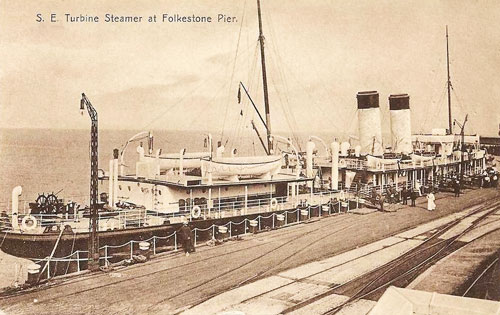
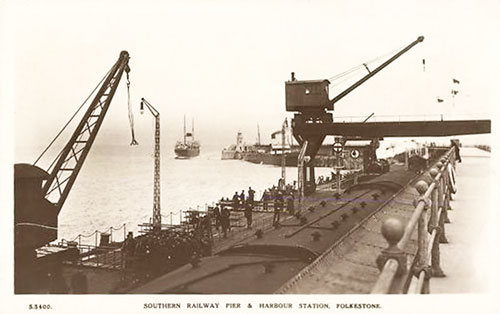
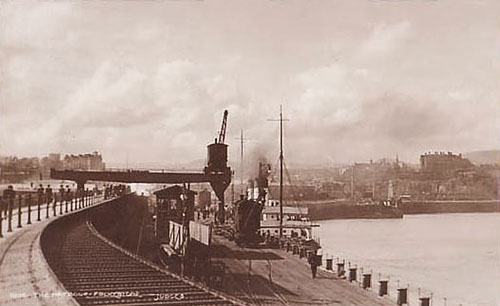
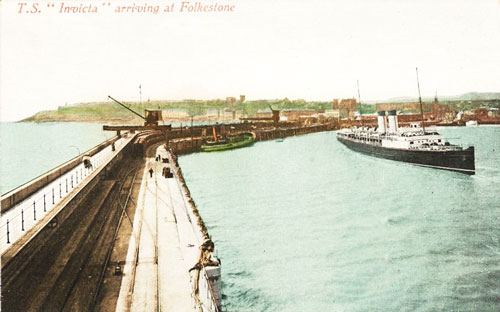
Postcards of Southern Railway turbines and Folkestone
Railway Pier
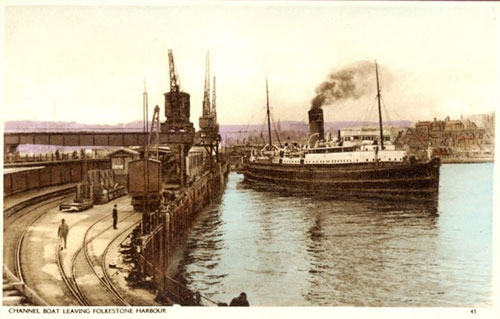
Postcards of SM Zeeland turbines and Folkestone
Railway Pier - leaving not Flushing (Vlissingen) not Boulogne
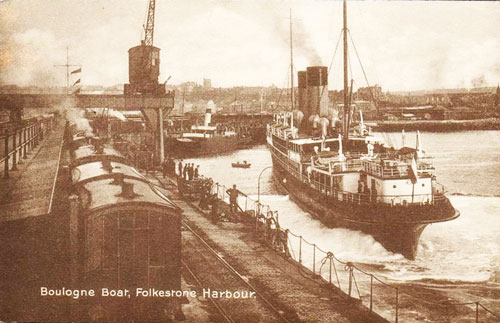
Images of Folkestone Railway Pier
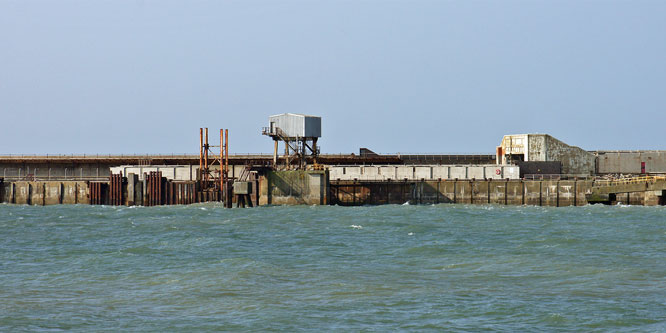
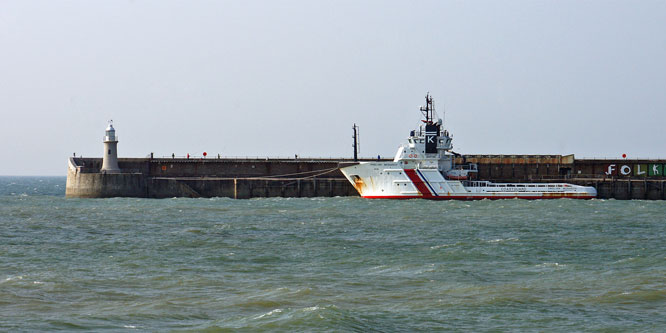
Folkestone Harbour
Station
Images of Folkestone Harbour station
Photo: © Ian Boyle, 31st May 2005
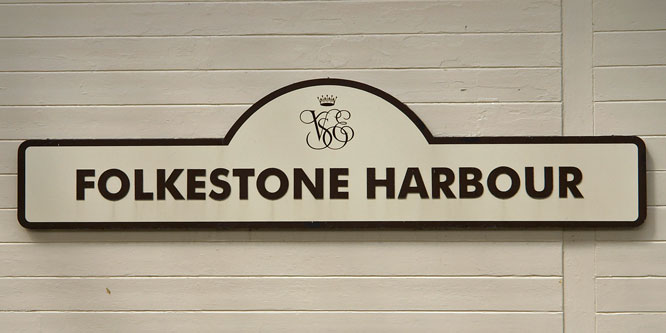
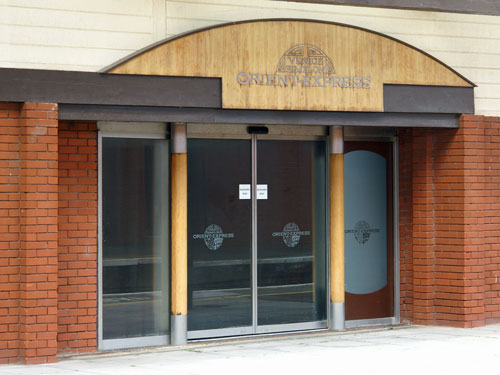
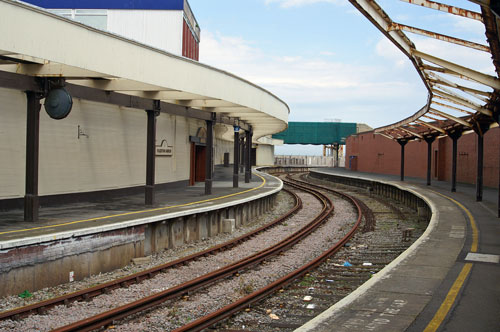
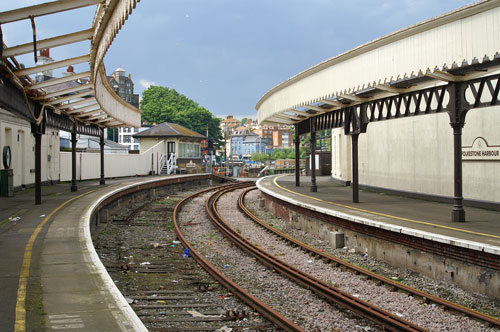
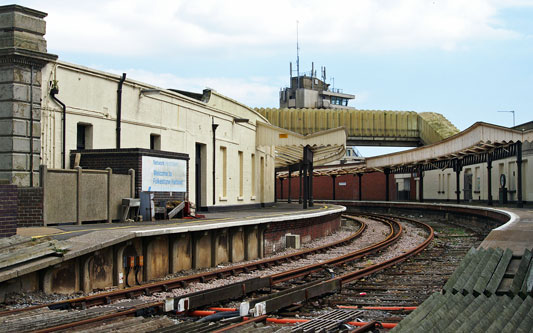
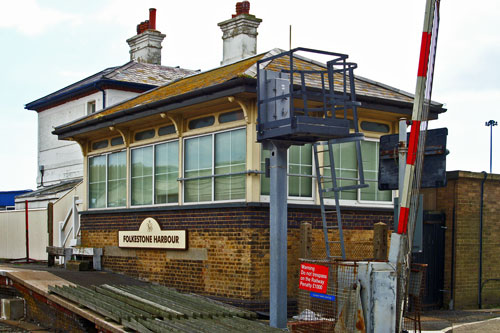
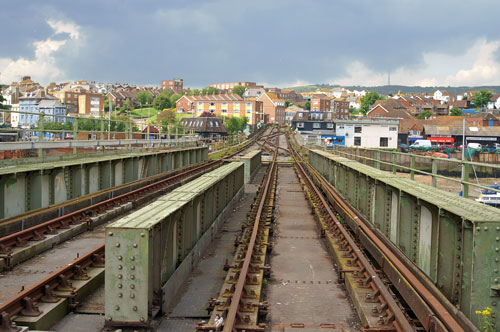
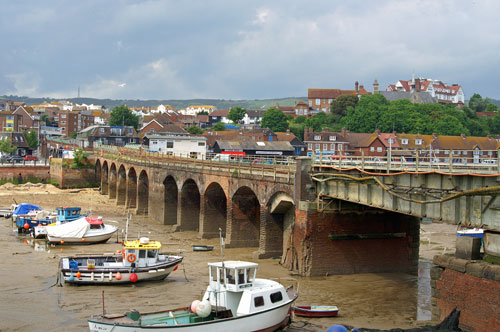
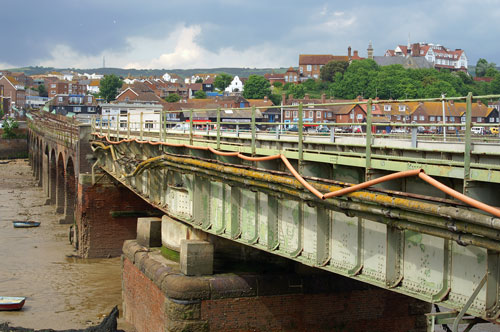
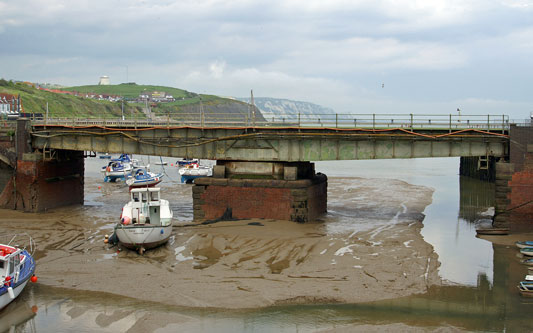
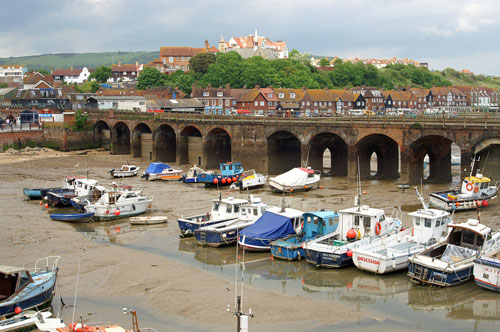
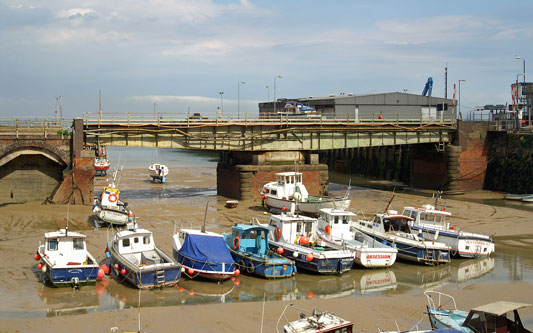
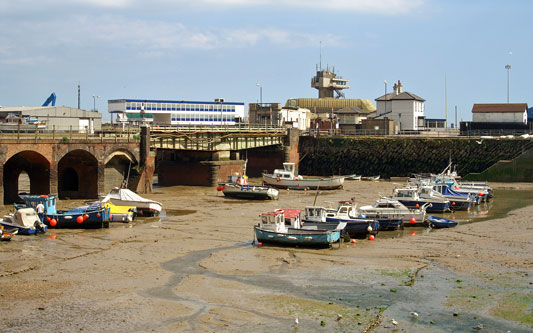
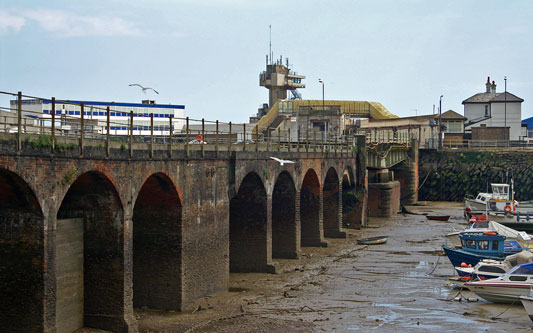
Pier and harbour works were built at Folkestone
between 1807-1820, but the harbour silted up and its removal was deemed too
expensive. The South Eastern Railway (SER) took over the harbour in 1842 and
commenced dredging to make Folkestone their principal port for the
continent. In 1848 they built the ornate wooden lighthouse, known as the
Horn Tower, shown in the first postcard below. The SER then built a new
breakwater in 1860 with a new lighthouse at the end. This lighthouse remains
in use and is accessible via the pier. The Horn Tower was decommissioned and
dismantled in 1941.
Postcard of Folkestone Pier Horn
Tower of 1848
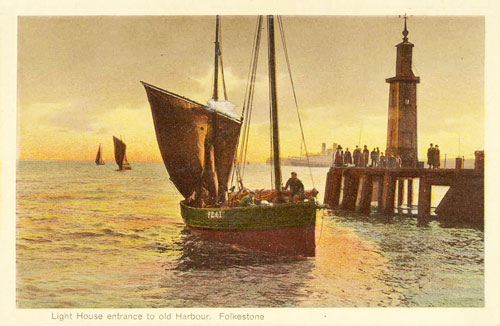

Folkestone Pier New Lighthouse
with the LC&DR paddle steamer Empress
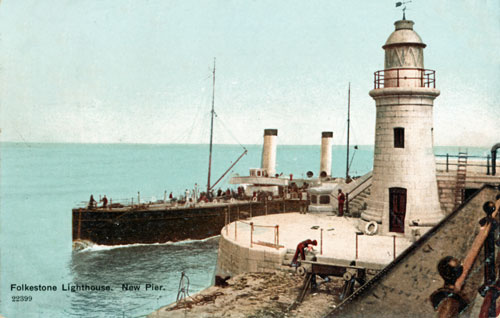
Folkestone Pier New Lighthouse
with the turbine Onward

Folkestone Pier with New
Lighthouse and Sealink's Vortigern
Photo: ©1980 Ian Boyle
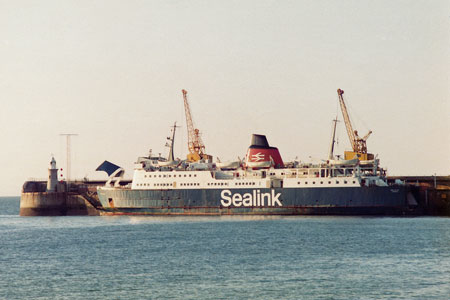
Folkestone Pier with New
Lighthouse
Photos: ©2011 Ian Boyle, 30th April 2011
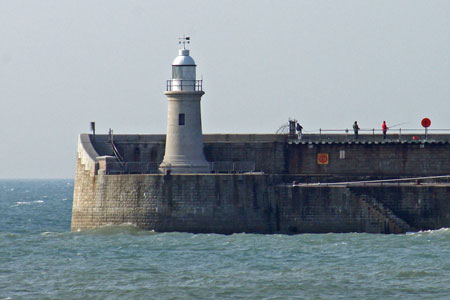
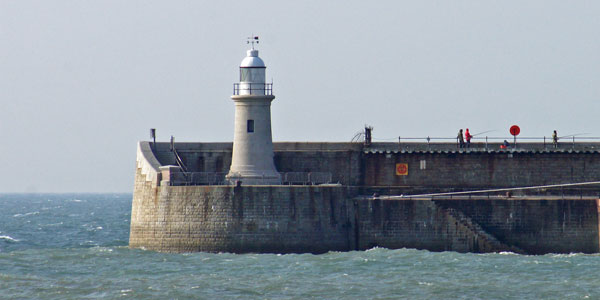
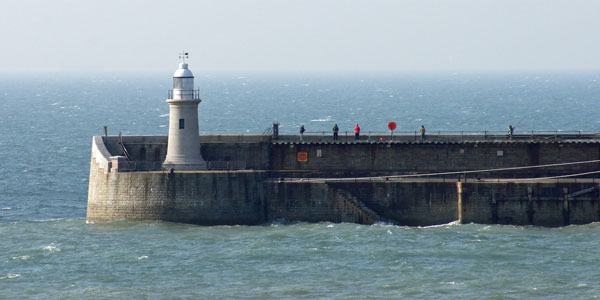
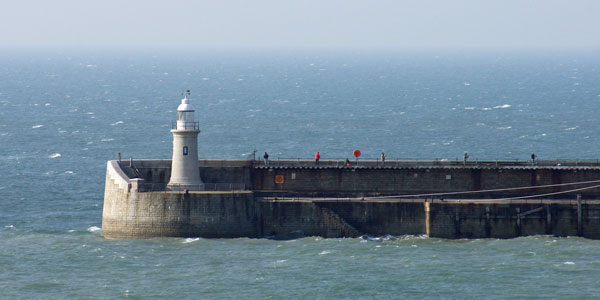
Pier and harbour works were built at Folkestone
between 1807-1820, but the harbour silted up and its removal was deemed too
expensive. The South Eastern Railway (SER) took over the harbour in 1842 and
commenced dredging to make Folkestone their principal port for the
continent. The SER then built a new breakwater in 1860 with a new lighthouse
at the end. The original harbour remained for the use of smaller vessels and
fishing boats.
Postcards of Folkestone Harbour
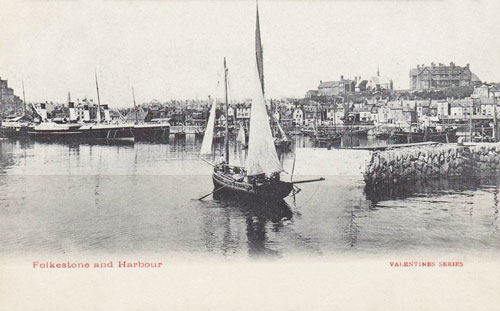
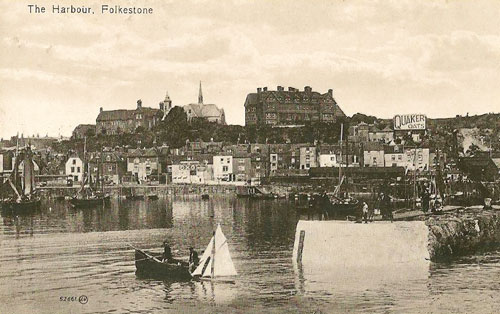
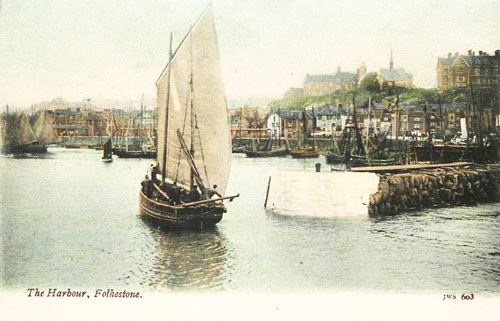
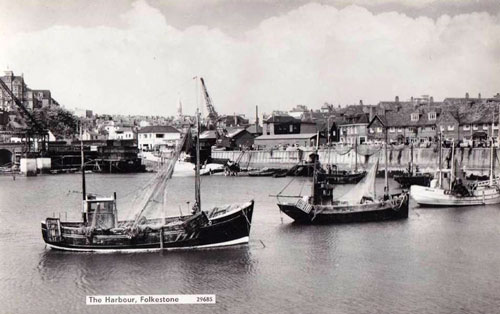
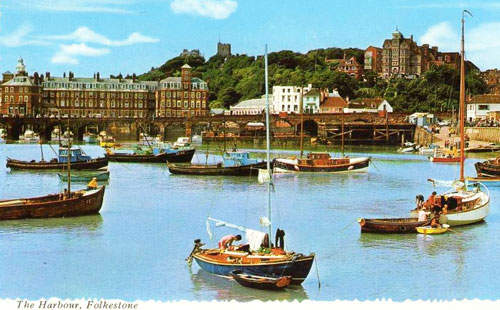
Images of Folkestone Harbour
Photos: ©2011 Ian Boyle, 30th April 2011
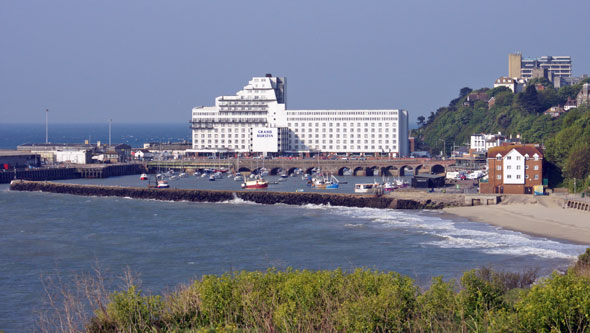
Folkestone had four cliff
lifts, all giving access to the Leas, the cliffs to the west of the
harbour. There were two adjacent lifts at the
East Leas (built 1885 &
1890), the Sandgate Lift
(built 1893) and a lift at the West
Leas (built 1904). Of these only the 1885 East Leas lift survives.
The Sandgate Lift closed in 1918, the West Leas Lift did not reopen
after WW2 and the 1890 East Leas Lift closed in 1966. The area to the
east of the harbour is known as the Warren, which has its own halt on
the railway to Dover.
Folkestone East Leas Lifts
Originally installed
in 1885, the Grade II Listed Leas Lift is a
funicular railway which carries passengers between the seafront and the
promenade. It is one of the oldest water lifts in the UK. The lift
operates using water and gravity and is controlled from a small cabin at
the top of the cliff. It has carried more than 50 million people since
it opened, in a process that is especially energy efficient. The lift
has a very small carbon footprint as it emits no pollution and recycles
all of the water used to drive the cars.
In June 2009, Shepway District Council’s lease
ran out and it was decided that the lift was too expensive to run.
Campaigners subsequently protested against the closure of the lift and
in April 2010, it was announced that the lift was to be restored.
Crofton Design, the consulting engineers responsible for the Leas Lift
restoration, was appointed as lead consultant to provide structural
engineering design. Crofton won the ‘Building Structures’ award at the
ACE Engineering Excellence Awards in May 2011 and won the ‘Restoration’
award at the ICE Engineering Excellence Awards in June 2011 for their
work on the lift.
G A Harpers were appointed as the main contractor
to carry out the necessary construction work. The renovation involved
replacing the mechanical and electrical wiring and ensuring that all
necessary safety standards in the two cars, the control systems and
stations, were met. There was also a focus on restoring the associated
power pumps that control the lift at the top and bottom stations. The
wheel bearings on the lift cars were all found to be damaged by
corrosion so the wheels were re-machined to provide the correct running
profile. Additionally, the corroded steelwork support structures within
the buried water storage tanks, which were leaking, were inspected and
replaced.
125 years after it first opened, the operation of
the Folkestone lift has been taken over by The Folkestone Leas Lift
Community Interest Company. The company operates the lift on behalf of
the community as a non-profit-making organisation and has opened the
attraction as a living museum.
Ref: wikipedia.com
Postcards of Leas Cliff Lifts
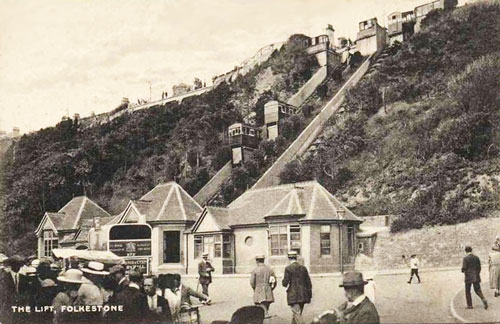
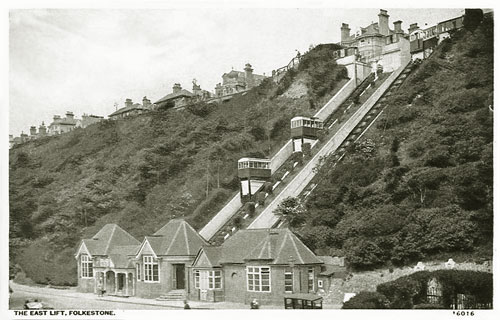
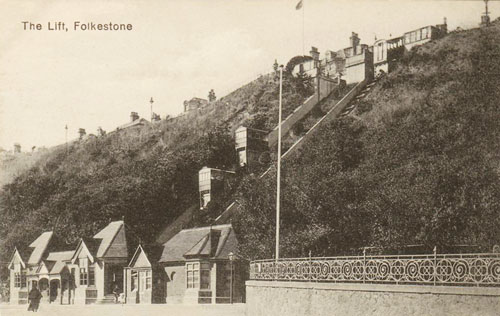
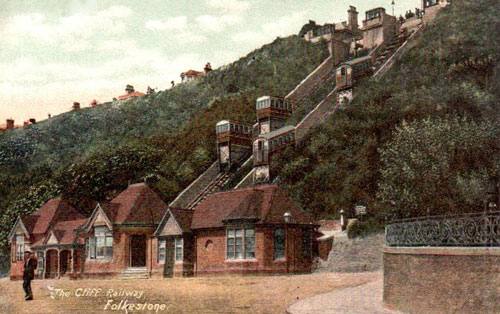
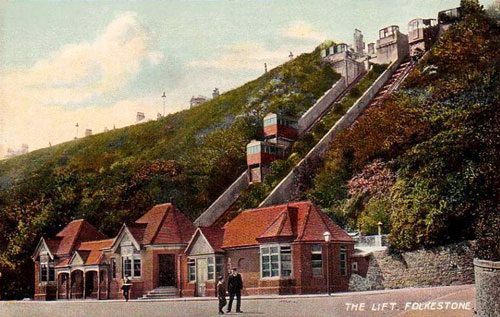
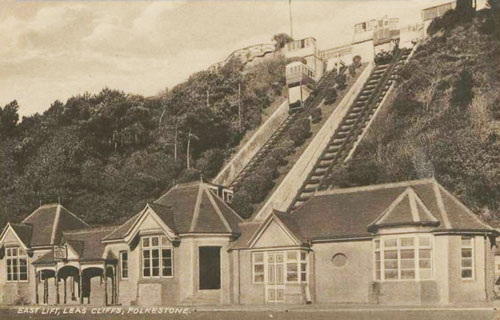
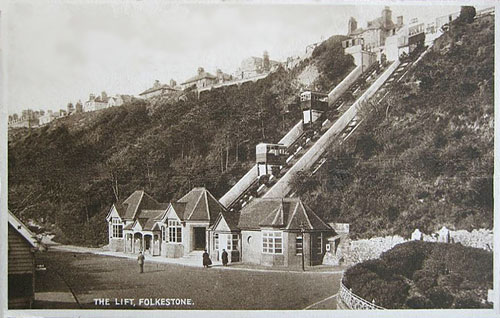
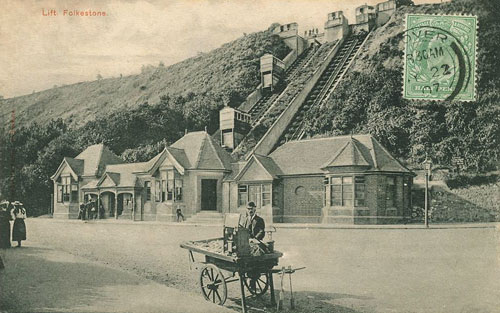
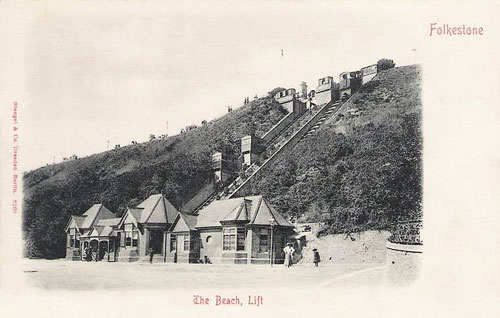
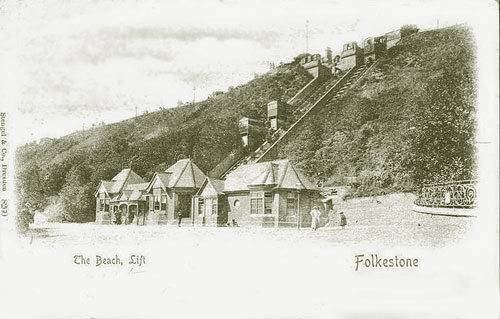
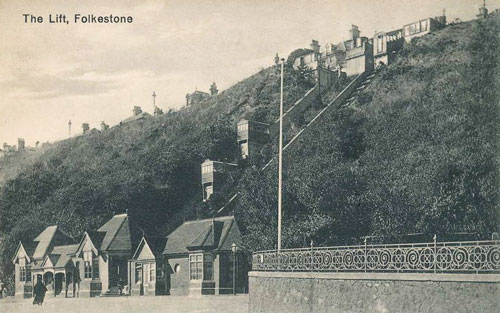
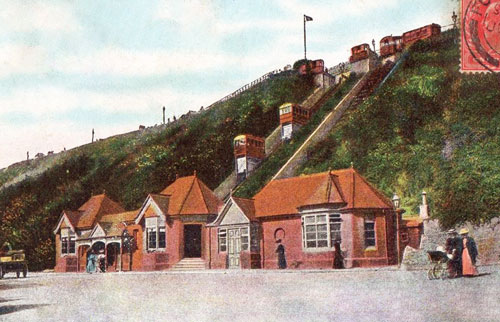
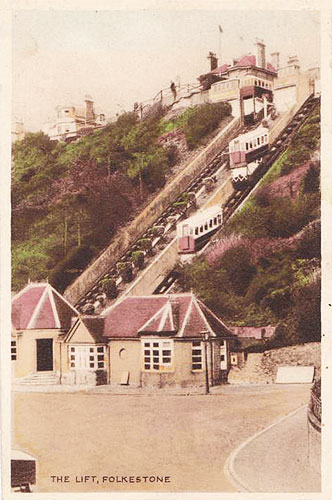
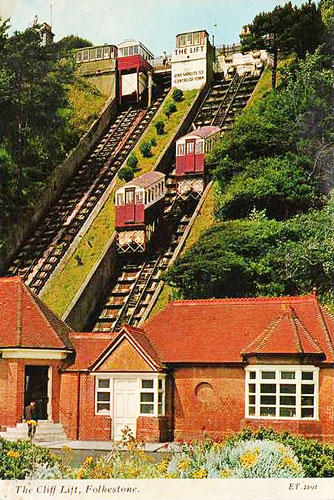
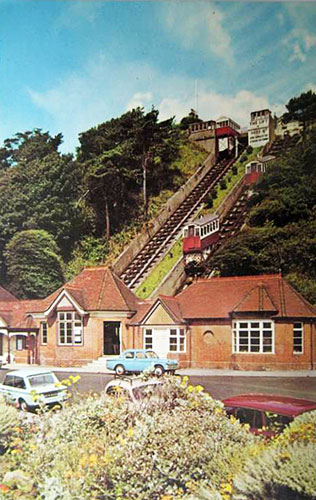
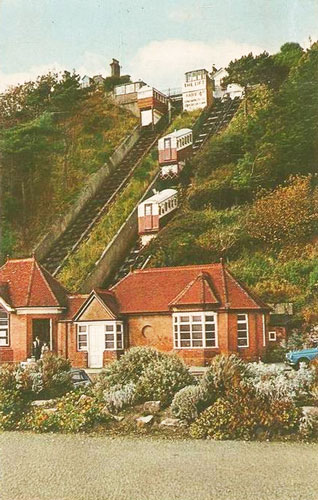
Postcards of Leas Cliff Lifts viewed from Folkestone
Victoria Pier
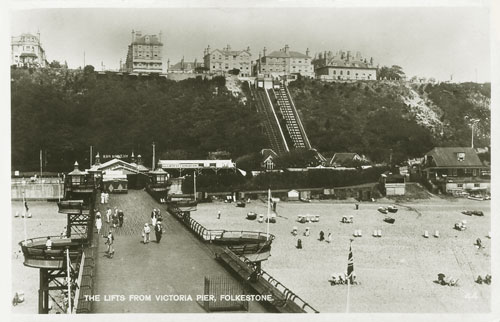
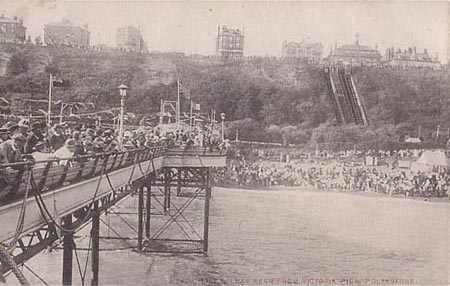
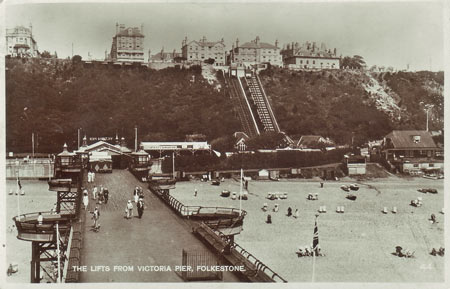
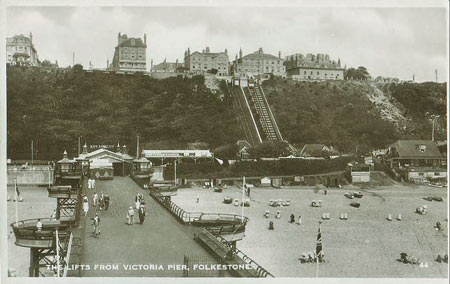
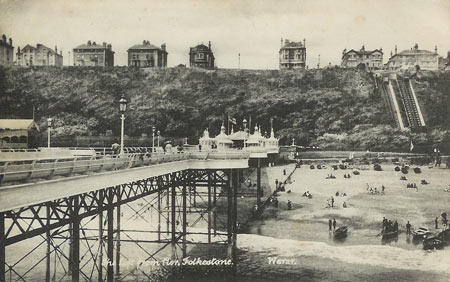
Postcards of Leas Cliff Lifts from Folkestone
Victoria Pier
Photo: © Ian Boyle, 10th May 2007
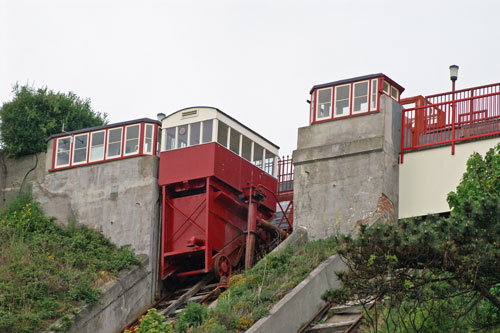
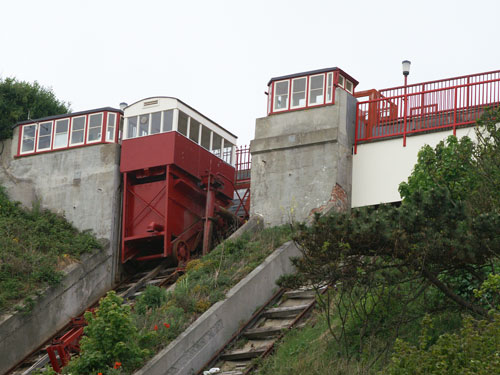
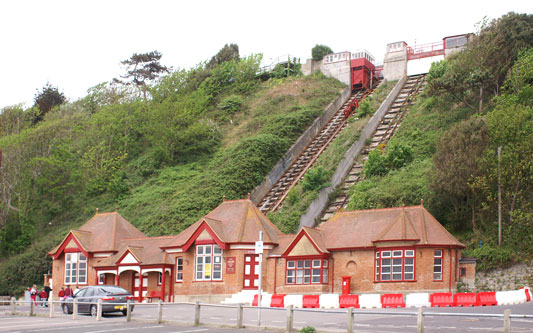
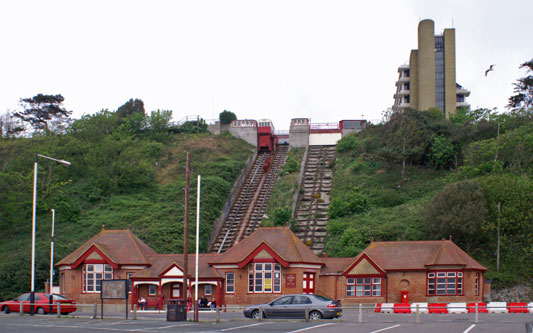
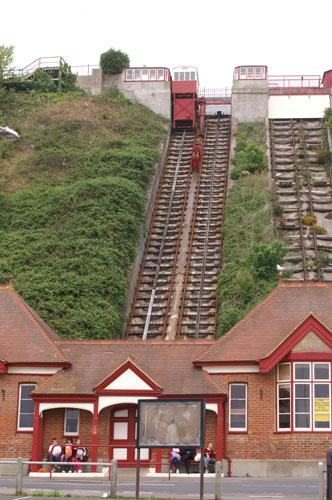
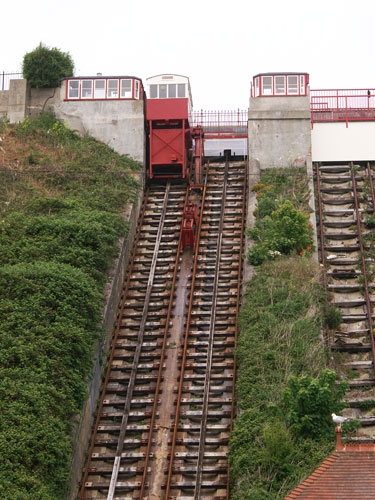
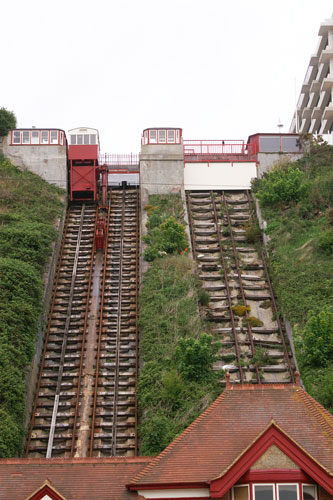
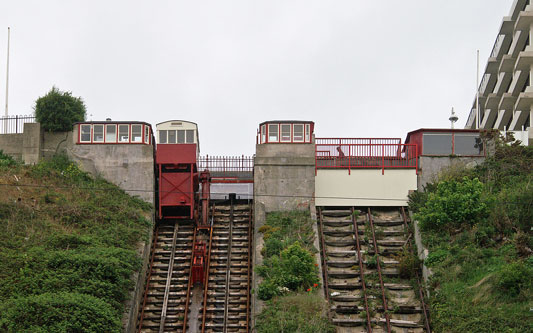
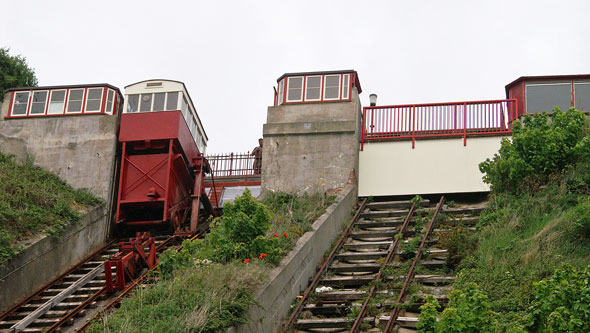
Postcards of the Sandgate Cliff Lift
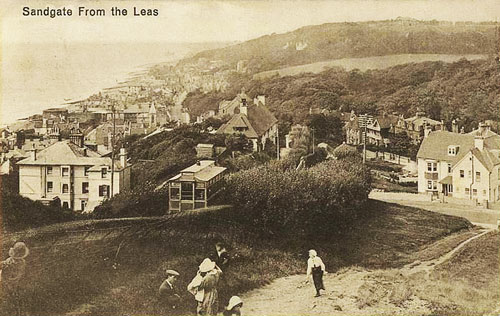
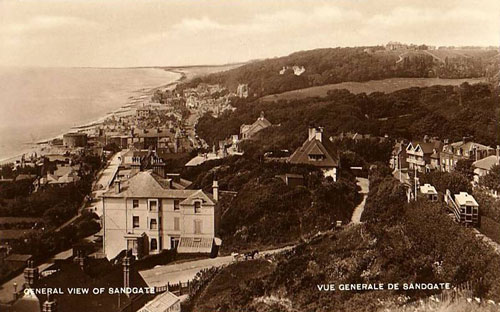
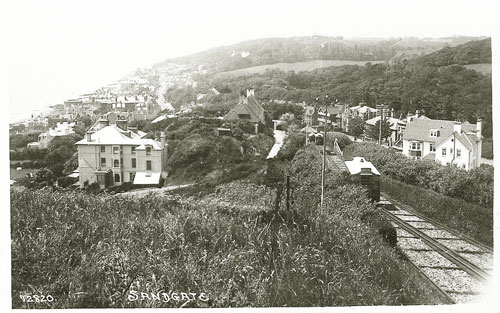
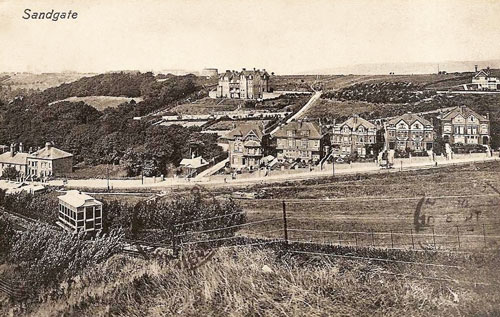
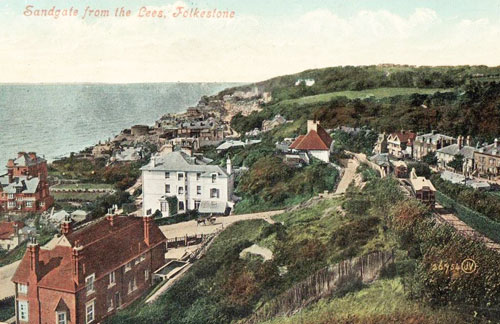
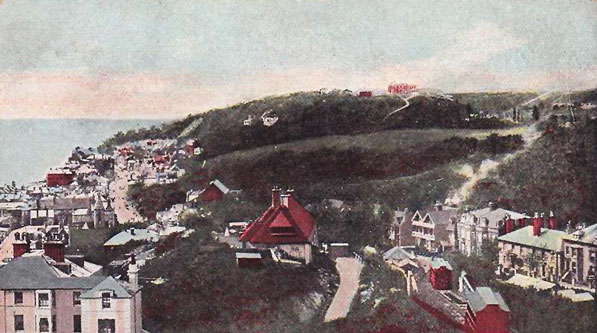
Folkestone West Leas Cliff
Lift
Postcards of the West Cliff Lift
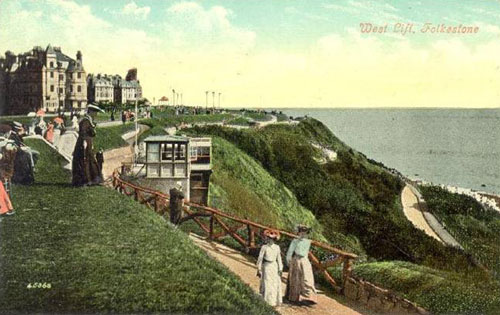
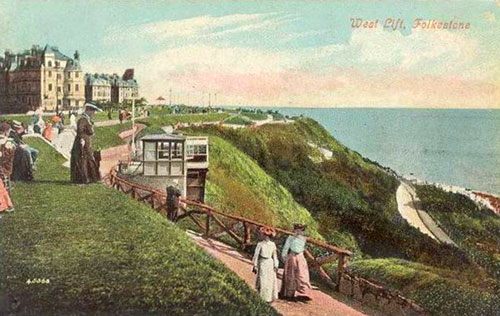
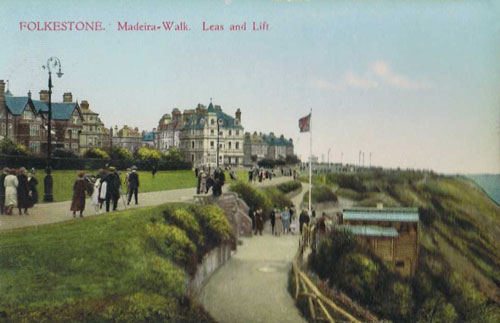
Postcards of the West Cliff Lift
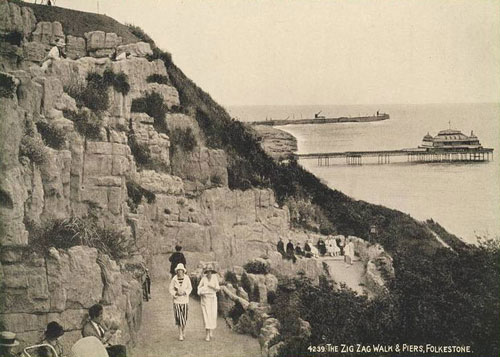
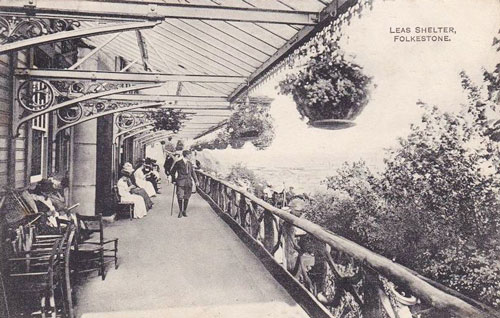
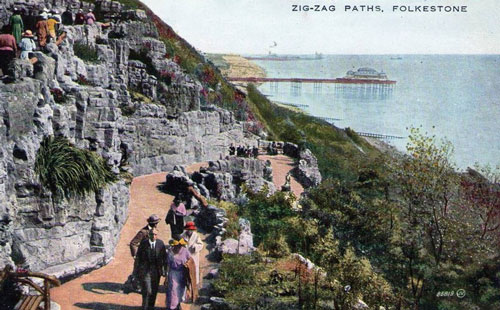


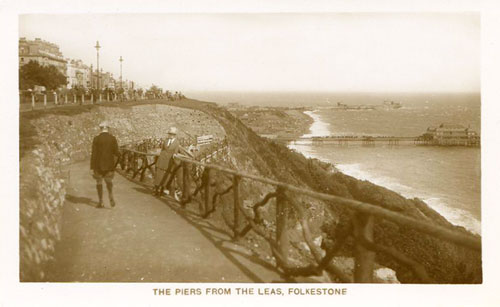
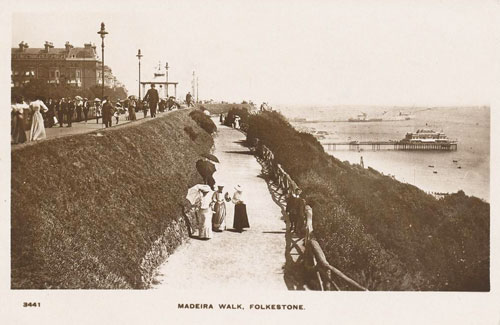
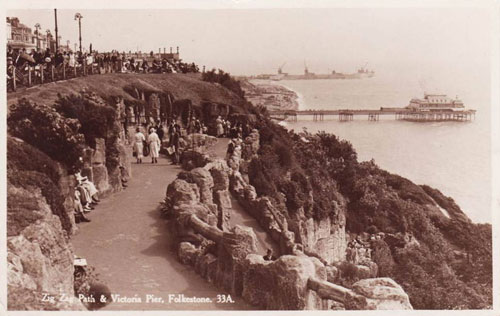
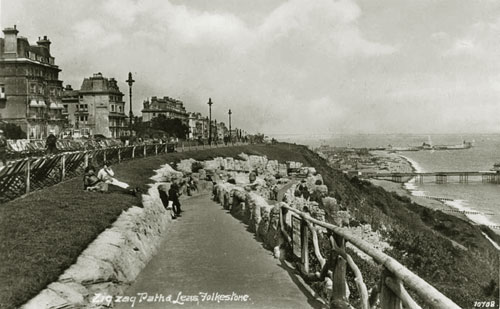
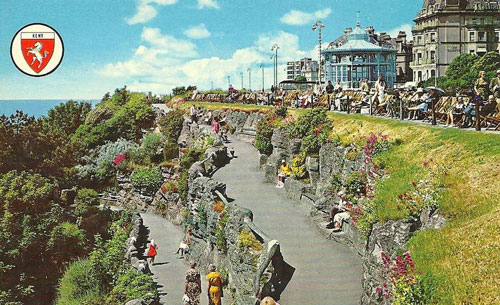
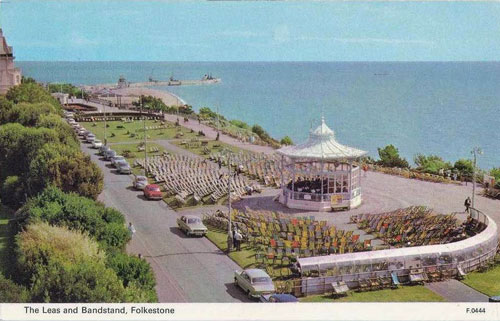
Postcards of the Warren and Warren Halt
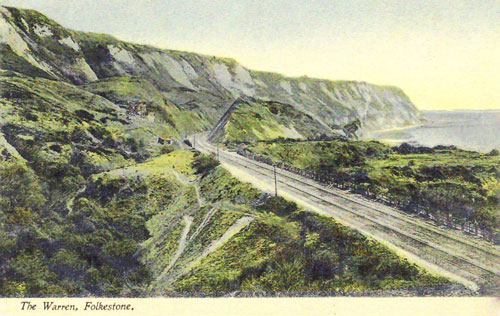
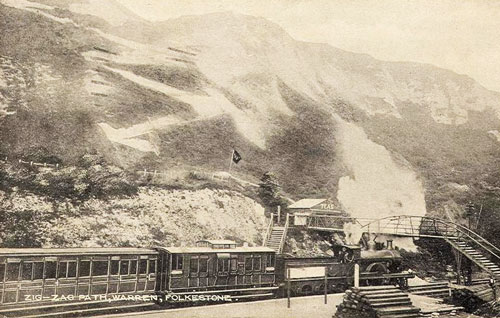
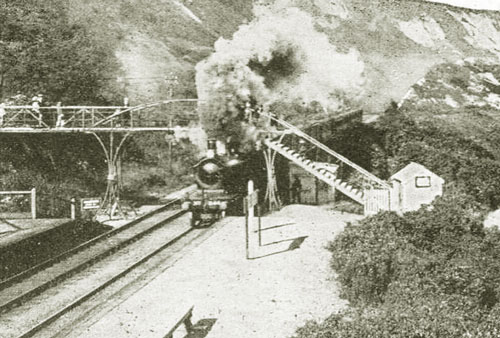
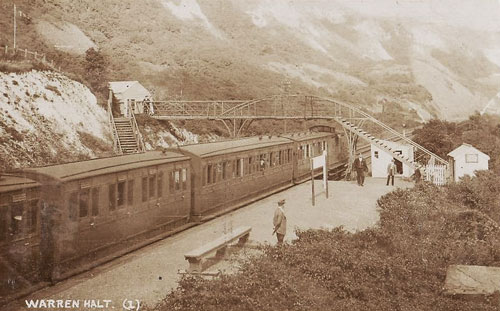
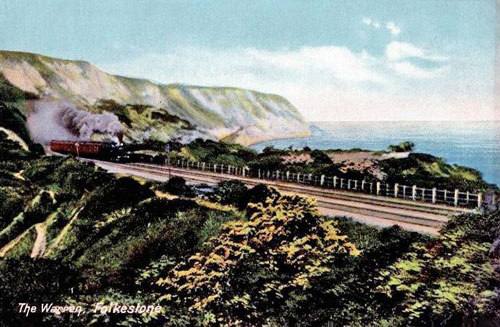
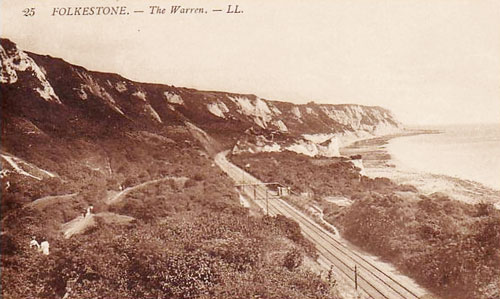
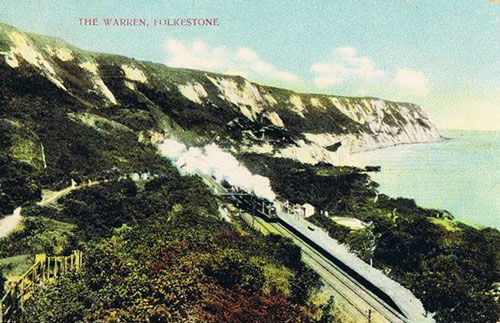
Folkestone Martello Towers
Martello Towers are small defensive forts first
built in the South East of England during the Napoleonic War between
1805 and 1808. They were built throughout the British Empire, in 5
different continents, during the first half of the 19th Century. 103 in
total were built around Britain, after the South East, a large number
can be found in Essex, Suffolk and in Ireland.
Martello towers were inspired by a round fortress
at Mortella Point in Corsica (completed 1565). In 1794 two British
warships for two days unsuccessfully attacked the tower at Mortella
Point. This impressed the British who copied the design for the British
Martello Towers.
The round structures followed a standard plan,
though varied in size. A typical South East Martello would be about 45
ft* (13.7m) in diameter at base and up to 40ft* (12m) tall. The masonry
walls were built of brick and rendered with lime mortar externally, and
were up to 13ft thick. Inside there were two main floors, the lower
floor housing supplies and a powder store, and the first floor the men's
quarters and officer's quarters. A single Martello housed between 15 and
25 men; a garrison of up to 24 men and 1 officer. The internal floor
area of both floors was 1300 sq ft.
The south coast Martellos stretch from Folkestone to Seaford (Sussex)
and are numbered 1-74. There are three Martellos close together in
Folkestone, numbered 1,2 and 3.
Ref:
geograph.org.uk/article/Martello-Towers
Folkestone Martello Tower No.1
Photo: © Ian Boyle, 2nd February 2013
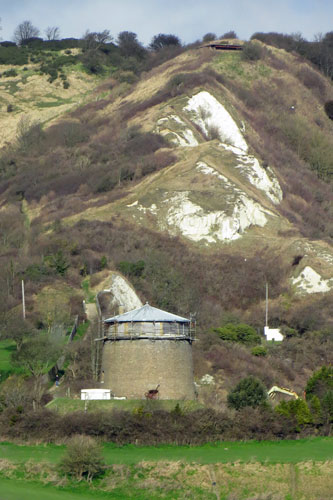
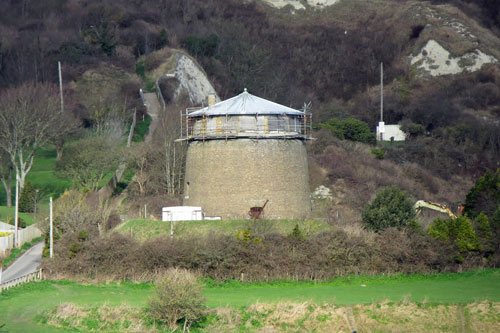
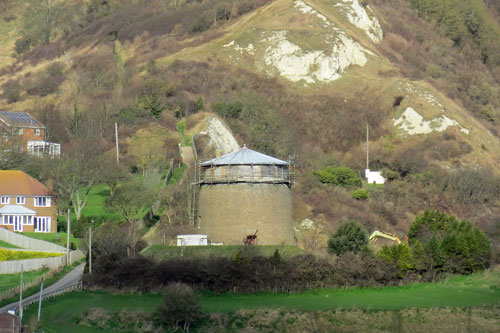
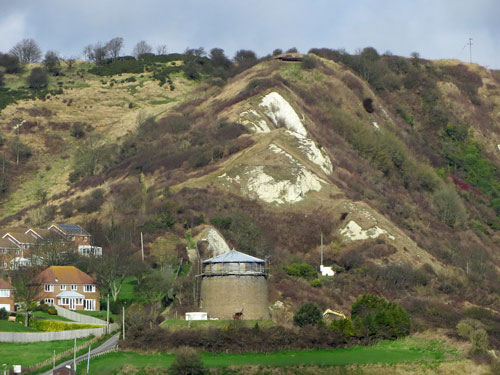
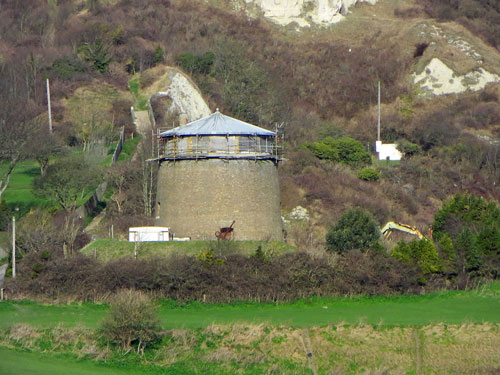
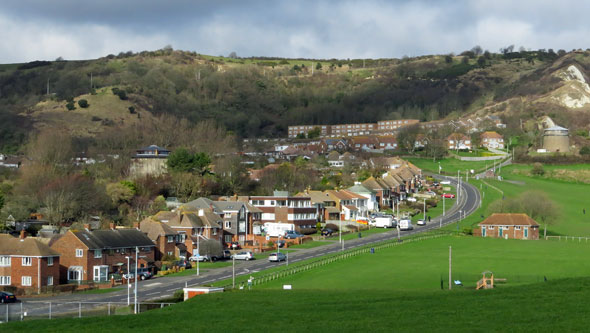
Folkestone Martello Tower No.2
Photo: © Ian Boyle, 2nd February 2013
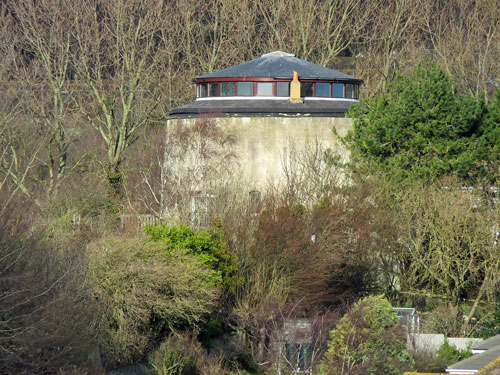
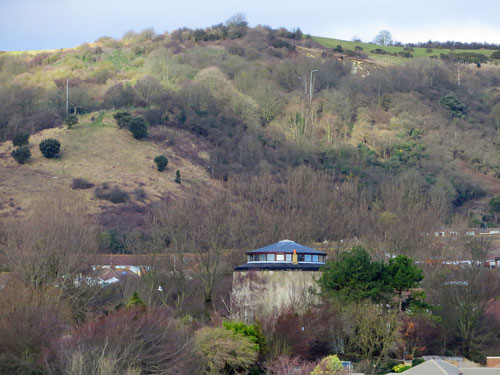
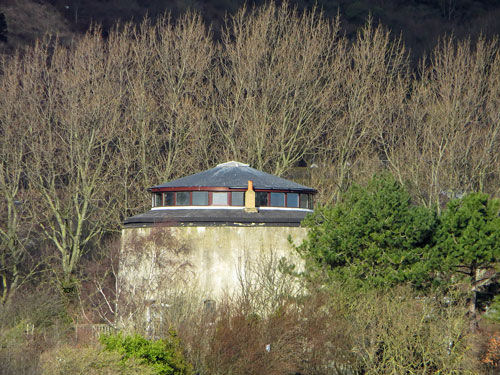
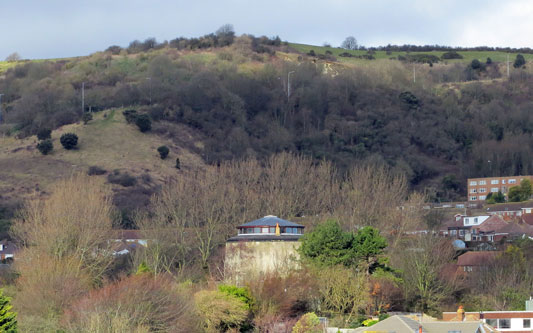
Folkestone Martello Tower No.3
Photo: © Ian Boyle, 2nd February 2013
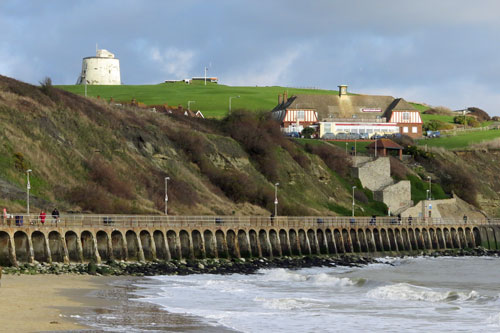
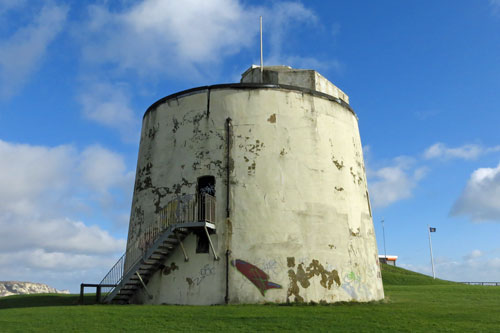
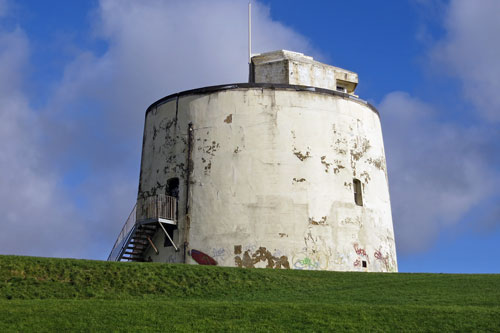
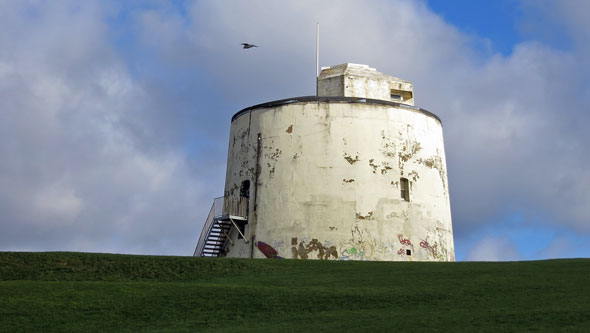
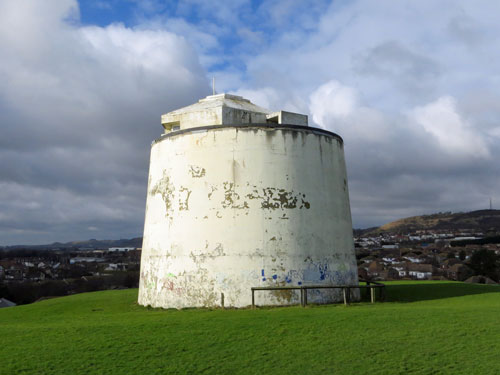
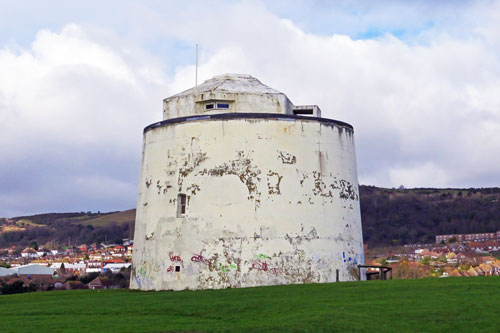
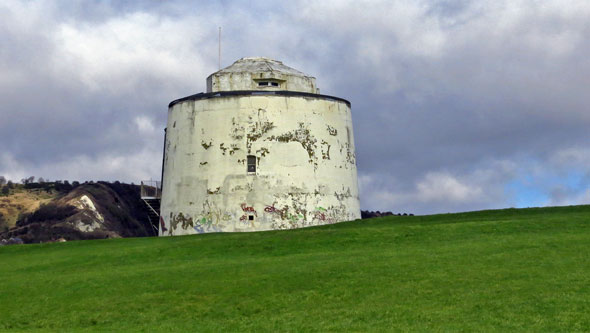
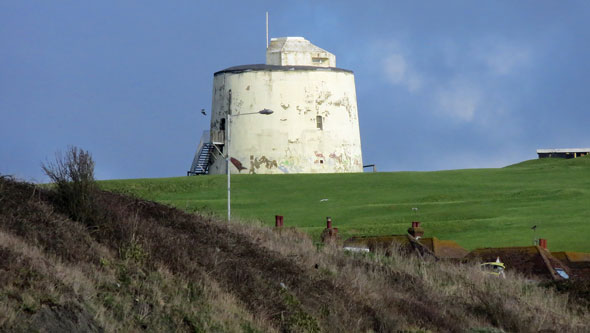
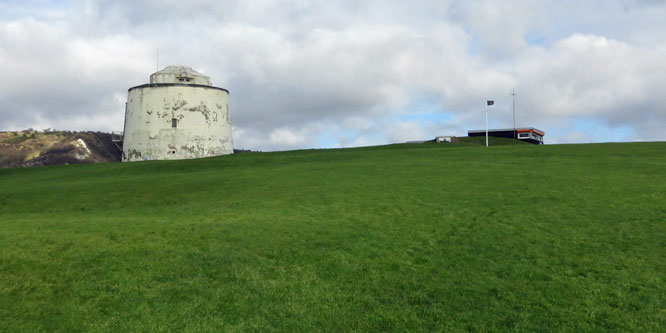
Folkestone Martello Tower No3
Photo: © Ian Boyle, 7th July 2007
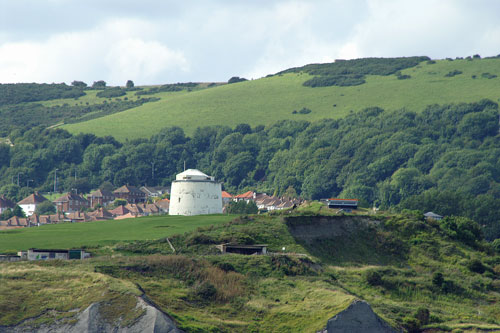
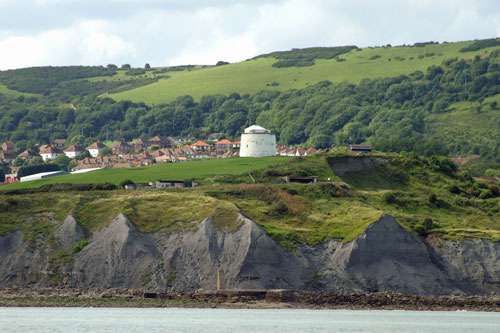
Folkestone Martello Tower No.3
Photo: © Ian Boyle, 4th April 2011
